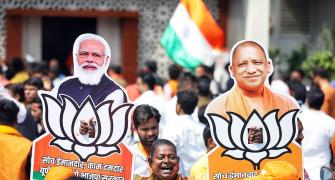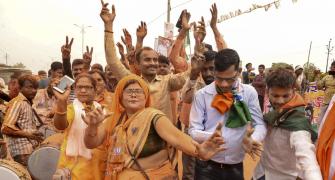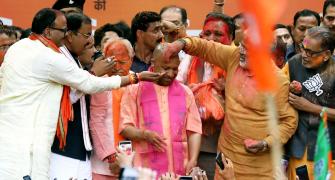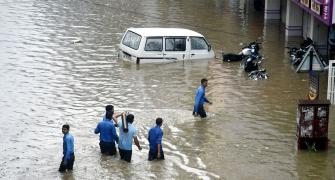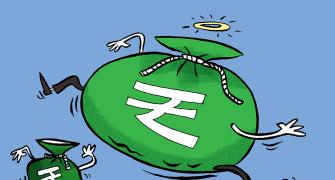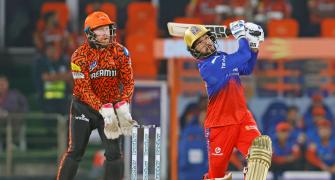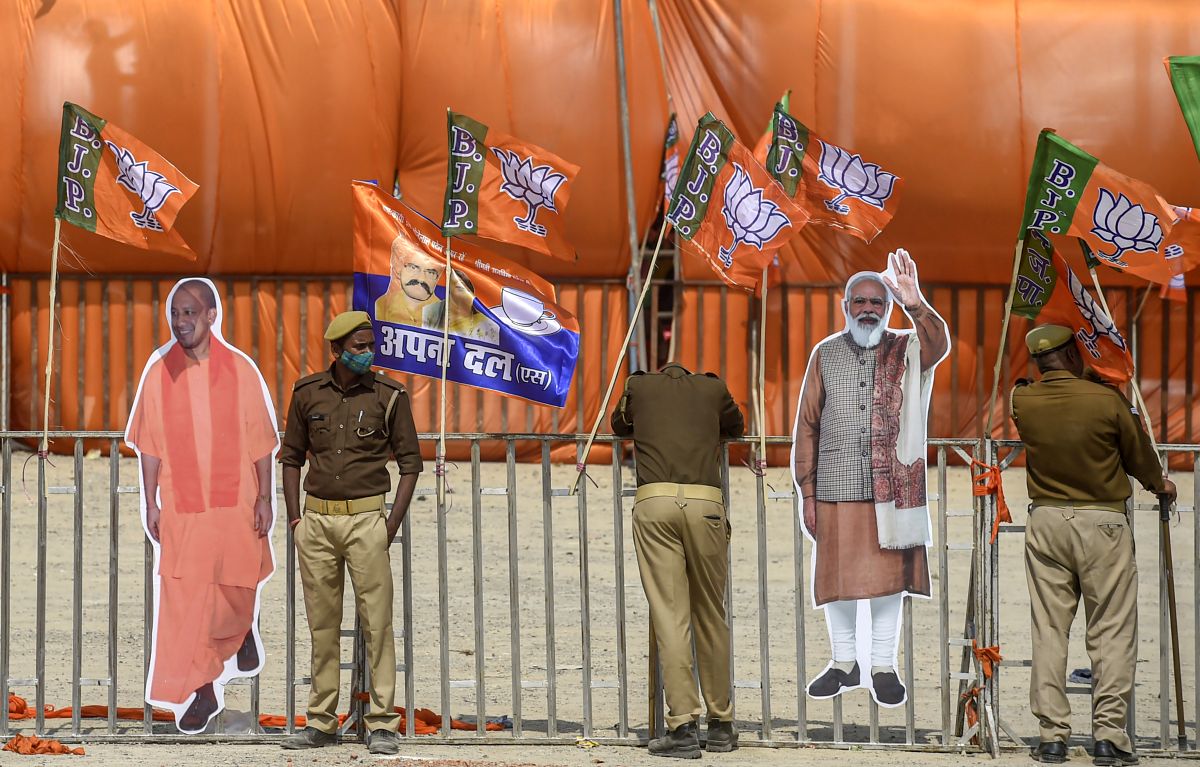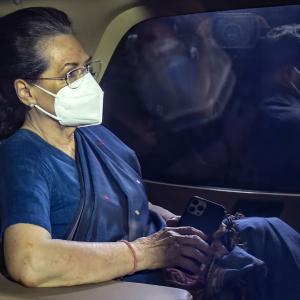The seat-share progression should worry the BJP.
From the previous assembly polls of 2017, through the assembly segments in its favour in the 2019 Lok Sabha polls and now in 2022, the BJP's seat-share has come down from a high 312 to 275 to 255.
N Sathiya Moorthy reads the political tea leaves after the UP and Punjab election verdicts.

Apologists for the divided Opposition nationwide are seeking to explain away the ruling BJP-NDA's electoral victories, starting with Uttar Pradesh, the nation's most populous state with the highest number of both MLAs and MPs, as a product of arithmetic.
It's not as simple or simplistic, but there is a whole lot of chemistry, some of which may still owe to arithmetic -- how divided Opposition cadres felt dejected as their leaderships' foolhardy ways, against a strong opponent, who was also in power and also had more popular leaders with relatively 'clean, or unsullied image', as yet.
Critics of the BJP-NDA, which in this case translates into critics of the Modi-Adityanath combo, have begun arguing how Akhilesh Yadav's Samajwadi Party combine lost seven seats by only 200 votes, 23 by 500 votes, 49 by 1,000 votes, and 86 by 2,000 votes.
That speaks volumes for Akhilesh Yada's campaign and his party's base and cadre-morale, compared to the heavyweight campaign of the BJP, ruling the state and the Centre, with the nation's most charismatic personalities of our times at the helm. The SP's RLD ally won another eight seats.
That is also a measure of Yadav's over-confidence in not going in for an alliance with the likes of the BSP and the Congress -- or, some may argue thus.
Elections, yes, are about chemistry, and arithmetic does not always work in the same way when artificially added up, especially post-poll. Anyway, it's all now in the past and should end there.
As UP poll figures showed, the BJP alone bagged 255 of 403 seats with its allies Apna Dal-S winning 12 and the Nishad Party, six -- a total of 273.
If it reads like an omen, that is the number of seats the victor would require in the 542-member Lok Sabha, in elections 2024, two years hence. Against this, the SP won 111 seats, while its ally RLD got eight seats and the Suheldev Bharatiya Samaj Party got six seats.
Yet, the jubilant BJP should not throw caution to the winds, as their alliance has won only 41% of the total votes in the crucial north Indian state.
They, not their adversaries, should be adding up the vote-shares of their adversaries, to see for themselves show tenuous this victory was -- though it is still for keeps.
Among them, the SP (32.1%), the all-but-forgotten BSP of even more forgotten Mayawati (12.9%) and the Congress (2.33%), adding up to 47.33%.
The seat-share progression should worry the BJP even more. From the previous assembly polls of 2017, through the assembly segments in its favour in the 2019 Lok Sabha polls and now in 2022, the BJP's seat-share has come down from a high 312 to 275 to 255.
Against this, the SP's seat-share has more than doubled, to 111, from 47 (2017) and 40 (2019).
Yes, UP is a stand-alone case, but then UP is also the state that adds heft to Lok Sabha poll seat-share. With such figures on the table, maybe some stray voices too could emanate all over again for taking a re-look at the polling system as a whole, as the present one is unfair to the loser(s).
But look at those nations that have moved away from the first-past-the-poll-system, they are in a greater mess and do not know how to get out of it. Neighbouring Sri Lanka makes for a good case-study.
If there is anything that the current election results have proved once again, it is that there is more to elections and popular mandates than just adding numbers and arriving at a verdict that is not of the voter.
It is about the ability of one side to convince the other that they are better than the other -- divided or not. Better still, that the other side is worse than themselves. This is electoral chemistry and this has worked in India all along, as elsewhere.
The AAP sweep in Punjab is a case in point.
People were fed up with the ruling Congress party, which suffered anti-incumbency under then chief minister Amarinder Singh, and worse after the high command threw him out and imposed cricket comedian Navjot Sidhu on them as state party chief -- and a faceless Charanjit Sin gh Channi as new chief minister. But they did not want the ruling BJP-NDA at the Centre after the year-long farmers' protests.
They wanted a government that functioned, a government that was relatively people-centric and were seeing and hearing about the way Delhi Chief Minister Arvind Kejriwal had changed poor people's lives and the education of their children, down below in Delhi. He became their natural choice, and for the same reasons that Delhi has been voting AAP.
But Kejriwal will have to find someone coming close to him in public image and imagery, but then the Punjabi public mood is so dejected that they would accept anyone who comes even a quarter closer to Kejriwal in performance and public image.
It is going to be easy and difficult for AAP in Punjab, as the three demoralised parties, namely, the Congress, Akali Dal and the BJP, are going to take time to re-discover themselves before the Lok Sabha poll.
But from the negative side, even for the AAP government, the elections are too close for comfort for them to prove their effectiveness and efficiency.
That is also what can hurt the BJP-NDA at the national-level. When their victory is based more on chemistry than arithmetic, then they need to put greater efforts to keep the chemistry working. Prime Minister Narendra Modi is still a vibrant leader with a positive public image, but it is not how the voter may or may not perceive him two years from now.
Remember, then prime minister Manmohan Singh's public image in 2009 was not what it ended as five years hence. It also had a lot to do with the BJP's kind of targeted social media campaign. No one else has been able to replicate it at the national-level, yet AAP and Kejriwal did achieve the same effect in a smaller state like Delhi -- and not just once.
It is not to say that AAP and Kejriwal are going to jump onto the national scenario in a quick-step. It is only to underline the fact that ten years after Modi's maiden victory in 2014, there is a new generation of first and second-time voters, whose imagination some other faceless leader may be able to capture better through a better-managed campaign.
Maybe, the likes of Prashant Kishor would have to make way for other people with newer ideas that not just he, but his generation of poll strategists, may be shy of observing and accepting. This is true of political leaderships, including the dynamic Modi.
Part of the problem with the Congress is that it continues to live in the past, even if its so-called future generation leaders in Rahul and Priyanka are age-wise younger than most others in the party's top-rung.
Ironically, almost every member of the G-23 Congress cabal is past their own prime. They are past their seventies. Most of them got face recognition during Sanjay Gandhi's Emergency darbar, over 45 years ago. All them want the Nehru-Gandhis out, and for good reasons -- to make way for a non-family person at the helm. But none of them wants to make way for an younger generation leader, even of his or her own choice.
It is here the BJP and Modi scored. By brutally keeping Advani and Murli Manohar Joshi away, but only when the party and the nation were ready for it, they have been able to ring out the tired, old Congress too out of power first and out of the power-structure, since.
Yes, pro-BJP commentators would lay heavy dependence on the well-structed RSS-centric cadre-based with their systemic and systematic work-ethics, both at the ideological and grassroots levels. But when things don't work, nothing can stop or reverse the trend.
Just now, it does not look it that way for the BJP. However, it remains to be seen what plans Adityanath has for himself and for others in the run-up to elections 2024.
In a near-similar situation in 1998-1999, the Vajpayee-Advani duo was keener on putting down party chief minister Kalyan Singh for winning close to 60 of 80 Lok Sabha seats from UP than retaining the state for the party. The BJP-NDA lost elections 2004 that followed.
At the time, the BJP did not have an UP-centric poll issue, especially after the Ayodhya demolition in 1992. This time round, they would have the Ayodhya temple ready as their major campaign-plank.
There is the Modi-Shah duo at Delhi and an equally successful Adityanath in Lucknow. Who is going to claim credit for the same, and in what all ways, will be the point on which electoral chemistry may be centred in 2024.
They may then require no other issue to lose as much as to win.
Though purely speculative, no one should be surprised if Modi is keen on a power transfer to Home Minister Amit Shah prior to 2024, if that is the intention. If nothing else, Shah would not want to become another Advani, having won UP for the BJP as its chief strategist-cum-executor in 2017, for Yogi Adityanath to appear almost out of nowhere and usurp the chief minister's job, for which there were too many contenders.
N Sathiya Moorthy, veteran journalist, political analyst and author, is Distinguished Fellow and Head-Chennai Initiative, Observer Research Foundation.

